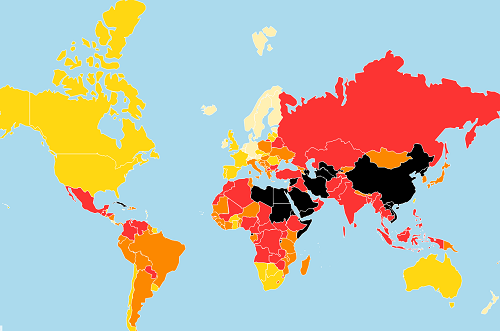
Watchdog Keeps Georgia’s Press Freedom Index Unchanged

2017 World Press Freedom Index, Reporters Without Borders.
Georgia’s press freedom score remained unchanged in 2016 over the previous year, according to a study by the Paris-based watchdog group Reporters Without Borders.
2017 World Press Freedom Index, a country-by-country survey on the level of freedom available to journalists, covers developments of 2016.
Georgia according to the survey, is ranked 64th in the table of 180 countries with 27.76 points, same as it was for the 2016 survey, which is up from 69th place in 2015 (27.70).
The index rankings are based on a scale of 1 to 100, with 0 representing the highest and 100 the lowest level of press freedom.
None of the countries of the former Soviet Union (except the Baltics) is ranked ahead of Georgia.
“The reforms of recent years have brought improvements to Georgia’s media landscape: media ownership transparency, satellite TV pluralism, and an overhaul of the broadcasting regulatory authority,” the Reporters Without Borders said in its brief index-related write up on Georgia.
The organization spoke on negative developments as well. “After a series of scandals, the constitutional court ruled in April 2016 that surveillance by the intelligence agencies should be subjected to certain safeguards,” it stated.
“Violence against journalists is less frequent although threats are often reported,” the organization added.
It also stated that “despite some progress,” the media environment continues “to be very polarized,” with “media owners often calling the shots on editorial content.”
It also touched upon the Rustavi 2 TV court dispute, saying that “the war for ownership of the main TV channels is a source of concern for the future of pluralism.” “The fate of the main national opposition TV channel, Rustavi 2, will serve as a test.”
The Reporters Without Borders compiles its annual survey based on several criteria measuring pluralism, media independence, media environment and self-censorship, legislative framework, transparency, and the quality of the infrastructure that supports the production of news and information. The qualitative analysis is then combined with quantitative data on abuses and acts of violence against journalists documented by a network of correspondents in individual countries.
This post is also available in: ქართული Русский